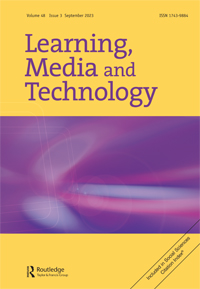Technical agonism: embracing democratic dissensus in the datafication of education
IF 3.1
1区 教育学
Q1 EDUCATION & EDUCATIONAL RESEARCH
引用次数: 0
Abstract
ABSTRACT This paper interrogates whether technical democracy is well-suited to contend with possible technical controversies, including the increasing prevalence of EdTech in public schooling. Drawing across Habermasian ‘deliberative democracy’ that seeks consensus-derived resolution, as well as more agonistic approaches that embrace conflict as the means for pursuing pluralistic values, we use this paper to problematise technical democracy for its potential to produce agonistic and pluralistic im/possibilities. Drawing on case studies developed from our previous research into digital platforms and infrastructures, we consider what an alternative to technical democracy might offer towards realising democratic ideals through what we call technical agonism. Using these thinking tools, we argue that a move towards technical agonism would centre dissension and scepticism as fundamental features of liberal democratic institutions, while also providing opportunities for schooling to be reimagined in ways that are more democratic and ethical.技术斗争:在教育数据化中接受民主异议
本文探讨技术民主是否适合应对可能出现的技术争议,包括在公立学校日益普及的教育技术。借鉴哈贝马斯的“协商民主”,寻求共识衍生的解决方案,以及更多的对抗方法,将冲突作为追求多元价值的手段,我们用这篇论文来质疑技术民主,因为它有可能产生对抗和多元的可能性。根据我们之前对数字平台和基础设施的研究中开发的案例研究,我们考虑了技术民主的替代方案可能通过我们所谓的技术斗争来实现民主理想。利用这些思维工具,我们认为,向技术斗争的转变将把分歧和怀疑作为自由民主制度的基本特征,同时也为以更民主和道德的方式重新构想学校教育提供了机会。
本文章由计算机程序翻译,如有差异,请以英文原文为准。
求助全文
约1分钟内获得全文
求助全文
来源期刊

Learning Media and Technology
EDUCATION & EDUCATIONAL RESEARCH-
CiteScore
11.40
自引率
14.50%
发文量
53
期刊介绍:
Learning, Media and Technology aims to stimulate debate on digital media, digital technology and digital cultures in education. The journal seeks to include submissions that take a critical approach towards all aspects of education and learning, digital media and digital technology - primarily from the perspective of the social sciences, humanities and arts. The journal has a long heritage in the areas of media education, media and cultural studies, film and television, communications studies, design studies and general education studies. As such, Learning, Media and Technology is not a generic ‘Ed Tech’ journal. We are not looking to publish context-free studies of individual technologies in individual institutional settings, ‘how-to’ guides for the practical use of technologies in the classroom, or speculation on the future potential of technology in education. Instead we invite submissions which build on contemporary debates such as: -The ways in which digital media interact with learning environments, educational institutions and educational cultures -The changing nature of knowledge, learning and pedagogy in the digital age -Digital media production, consumption and creativity in educational contexts -How digital media are shaping (and being shaped by) educational practices in local, national and global contexts -The social, cultural, economic and political nature of educational media and technology -The ways in which digital media in education interact with issues of democracy and equity, social justice and public good. Learning, Media and Technology analyses such questions from a global, interdisciplinary perspective in contributions of the very highest quality from scholars and practitioners in the social sciences, communication and media studies, cultural studies, philosophy, history as well as in the information and computer sciences.
 求助内容:
求助内容: 应助结果提醒方式:
应助结果提醒方式:


